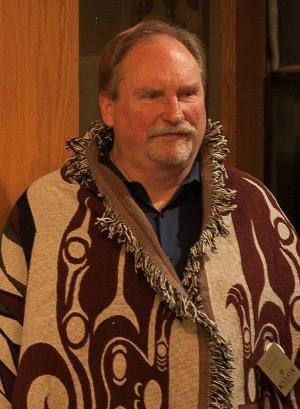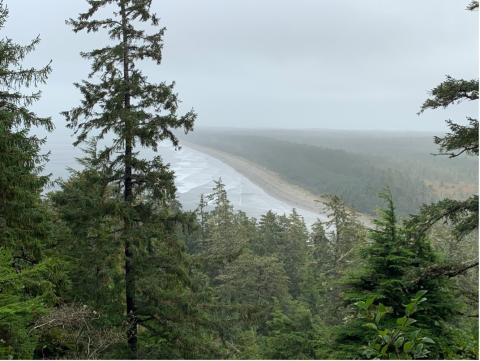Warrior Lawyer Profile: Greg McDade

Austen Erhardt
Allard JD Candidate 2023
Jun 23, 2022
The Persistent Pragmatist
“I think the battle for climate change is largely lost. Our kids will inherit a very different world than the one we live in.” Not words that you might expect from the person who co-founded two of Canada’s largest environmental law organizations, but Greg McDade has never taken a conventional approach to environmentalism.

McDade attended UBC Law in the 1970s after reading David Estrin and John Swaigen’s 1974 book Environment on Trial, which, as McDade explained in our interview, showed “how you could actually do something” about environmental protection. He knew he wanted to be an environmental lawyer and chose to attend UBC, one of two schools in Canada offering courses in environmental law at the time.
Arriving at UBC, McDade learned that the school’s only environmental law professor was on sabbatical. Initially thinking he might be the only member of his class interested in environmental law, McDade soon discovered that UBC had a small environmental law club and became the club’s only first-year student member. When the upper-year students graduated, McDade—the only remaining member—inherited leadership of the club and recruited several other students. With the benefit of external funding from law student employment programs, the support of his fellow club members, and office space rented from former BC premier and mayor of Vancouver Mike Harcourt, McDade transformed the club into the West Coast Environmental Law Association (WCEL). While still a third-year law student, McDade became the full-time executive director of WCEL—which quickly became one of Canada’s foremost non-profit environmental law organizations.
McDade’s first case with WCEL was against the City of Penticton, BC, which was dumping sewage into a nearby lake. He convinced the municipal councils of downstream towns to support him in bringing an action in nuisance. “After I’d done that for a year, I realized that in these big cases, I was up against the best lawyers—and I was a lousy law student,” McDade says. “I thought, ‘I’d better go get some experience.’”
McDade then practiced criminal law for 10 years, developing his litigation skillset, and pursued environmental litigation off the side of his desk. Meanwhile, WCEL shifted from a litigation focus to creating policy papers, due to restrictions imposed by funders. “This was very frustrating to me,” McDade recalls. “Half of the directors wanted to be activists, and the other half wanted to hang on to the funding.”
In 1990, McDade connected with Stewart Elgie, a Harvard-educated Canadian lawyer who created a Canadian equivalent of the American Sierra Club Legal Defense Fund (now EarthJustice), with which Elgie had worked in Alaska on the Exxon Valdez oil spill. McDade became the first executive director and general counsel of this new organization, the Sierra Legal Defence Fund (SLDF). In 2007, SLDF became Ecojustice, Canada’s largest environmental law organization. Within two years, McDade was representing SLDF at the Supreme Court of Canada, intervening against a major dam in Friends of the Oldman River Society v. Canada and earning Justice La Forest’s acknowledgment that “[t]he protection of the environment has become one of the major challenges of our time.”
McDade was appointed Queen’s Counsel in 1996, and in 1997 left SLDF to join Ratcliff LLP, which specializes in Aboriginal law. “It occurred to me that First Nations’ rights were being more strongly recognized than environmental rights,” McDade says. “You or I as citizens really have no recognized standing before the courts to protect the environment as a private right … but First Nations did.”
McDade again appeared before the Supreme Court of Canada in Haida Nation v. British Columbia: a case that McDade believes “revolutionized” Aboriginal law, but started as an environmental case—an attempt by the Haida to protect the forests on their lands. McDade, through SLDF, first sued on behalf of the Haida Nation in 1995 over the extension of a tree farm licence issued to MacMillan Bloedel (now Weyerhaeuser). When the matter ultimately reached the Supreme Court of Canada in 2004, McDade—then working with Ratcliff—represented two other First Nations (Squamish and Lax Kw'alaams) that intervened in the case.

Looking back on his career, and considering the emergence of novel approaches in environmental law, McDade takes a pragmatic perspective. “My career has really been establishing ‘building blocks’ . . . . Politics and goodwill will only take you so far. That’s why I believe in the law. I believe that courts have power, because they can make people do things that they don’t want to do.”
Reminiscing on the quote that opened this article, which appeared in a 2009 edition of the UBC Law Alumni Magazine, McDade laughs. “People crapped on me at that point.” In defence of his statement, McDade notes that the current state of climate change is near what he would have predicted in 2009, and that the targets set by politicians to limit warming have continued to shift as they are not met. However, he doesn’t feel that all is necessarily lost.
“I became an environmentalist in the 1970s … acid rain, at that time, looked like an unsolvable problem. The ozone layer was being eaten away and nobody had a solution for that. The Great Lakes were dying. And all of those problems were solved when they became bad enough that politicians actually started doing something. I would say, with climate change, that nations—in the last two or three years—have been taking far more drastic action than they’d ever taken before. I wish they’d taken that 15 years ago,” McDade reflects. “So that quote of mine is only half true . . . . there are signs of optimism that we’re going to fix stuff.”
- Centre for Law and the Environment


